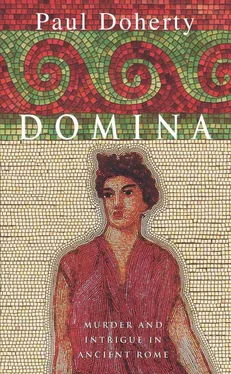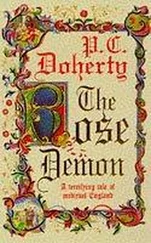Paul Doherty - Domina
Здесь есть возможность читать онлайн «Paul Doherty - Domina» весь текст электронной книги совершенно бесплатно (целиком полную версию без сокращений). В некоторых случаях можно слушать аудио, скачать через торрент в формате fb2 и присутствует краткое содержание. Год выпуска: 2012, ISBN: 2012, Издательство: Headline, Жанр: Исторический детектив, на английском языке. Описание произведения, (предисловие) а так же отзывы посетителей доступны на портале библиотеки ЛибКат.
- Название:Domina
- Автор:
- Издательство:Headline
- Жанр:
- Год:2012
- ISBN:9780755350490
- Рейтинг книги:3 / 5. Голосов: 1
-
Избранное:Добавить в избранное
- Отзывы:
-
Ваша оценка:
- 60
- 1
- 2
- 3
- 4
- 5
Domina: краткое содержание, описание и аннотация
Предлагаем к чтению аннотацию, описание, краткое содержание или предисловие (зависит от того, что написал сам автор книги «Domina»). Если вы не нашли необходимую информацию о книге — напишите в комментариях, мы постараемся отыскать её.
Domina — читать онлайн бесплатно полную книгу (весь текст) целиком
Ниже представлен текст книги, разбитый по страницам. Система сохранения места последней прочитанной страницы, позволяет с удобством читать онлайн бесплатно книгу «Domina», без необходимости каждый раз заново искать на чём Вы остановились. Поставьте закладку, и сможете в любой момент перейти на страницу, на которой закончили чтение.
Интервал:
Закладка:
‘How many?’ I asked.
Agrippina stopped her pacing and gestured with her hands.
‘Pollux told me there were at least ten, all masked and hooded.’ She continued, ‘Before he asked me to put him out of his agony, Pollux claimed at least half of them were either killed or wounded.’
‘It will be passed off as housebreaking,’ I replied. ‘A gang of thieves trying their luck.’
‘Housebreakers don’t move in groups of ten,’ Agrippina snapped. ‘And they don’t like cold steel. These men knew where to come and what they were after: Nero and myself.’
‘Messalina?’ I asked.
‘That bitch,’ Agrippina agreed. ‘Only someone wealthy could hire so many men, and give such precise instructions on what to do.’
‘You are safe,’ I replied. ‘Your son is unharmed. You can appeal to the Emperor.’ I spoke flatteringly.
Agrippina dismissed my words with a flick of her fingers. ‘I must think. I must plot!’ she declared and she was gone.
Agrippina was given little choice to do either. Messalina struck again, ruthlessly and to the point. The household slept late that morning until it was roused by messengers; informing Agrippina that both her sister Julia and the philosopher Seneca had been arrested for adultery, public lewdness, conspiracy and possible treason. If I hadn’t stopped her, Agrippina would have left immediately for the Palatine.
‘There’s nothing you can do,’ I urged.
Agrippina was fighting hard to control her temper. She had dismissed the stewards and the others waiting for her to carry out the funeral rites of the two Germans.
‘See to the funeral pyres,’ I urged. ‘Pack your bags and then clear your house. We’ll load the carts and leave Rome.’
Agrippina leaned forward, gripping the sides of the table as if the house was shaking.
‘Leave?’ she whispered. ‘Like some beaten dog?’
‘What can you do?’ I retorted. ‘Trot along and see Uncle Claudius? Tell him that his beloved wife tried to kill your son? You know what Claudius is like, he’ll dither about asking for evidence and Messalina will pounce. She’ll rope you in with your sister! Two of a kind, she’ll cry.’ I clutched her arm. ‘Or you can even be more stupid: go to the Emperor and defend your sister, tell Claudius that Julia is innocent of any charge. Do that,’ I warned, ‘and, by the end of the month, you and Nero will be no more.’
At first, Agrippina wouldn’t listen and let loose the most terrible rage. She strode up and down, knocking goblets, vases, statuettes onto the floor, slashing at cushions with a small knife, kicking over stools. At last her rage subsided, and she slumped onto a couch, face in her hands.
‘I’m thinking, Parmenon. Before you start boring me with your advice, I’m thinking.’ She took away her hands. ‘We’ll give the Germans honourable burial, and meanwhile tell my steward and chamberlains to pack, and load the carts. We’ll be gone from Rome within the day. I’ll send a message to Claudius protesting my innocence and saying how shocked I am by my sister’s actions.’
I smiled in agreement. Agrippina turned her head and glanced sideways at me.
‘But, one day, Parmenon, I’ll return!’
‘One day,’ I repeated.
Agrippina pointed to the door. ‘Leave me. Let no one come in.’
Agrippina kept to her word, except in one small detail: we stayed in Rome a further day to hear the verdict passed against Julia and Seneca. Both were exiled: Seneca, with all his stomach and liver troubles, to Corsica; Julia, that beautiful butterfly, was despatched to Pontia. Messalina showed her little mercy — within weeks the island was visited by Praetorian guards and soon afterwards we heard of Julia’s death.
Agrippina retreated to her villa at Antium with its flowery grottoes and shady colonnaded walks. She returned to her studies, corresponded with friends and entertained. She taught Nero how to swim and fish. She gave up pottery but took an active interest in gardening, in particular the development of certain poisons. She tested and preserved these before developing antidotes. She hired physicians, leeches and apothecaries, who would comment on the properties of certain substances and plants. Agrippina was a keen student. At the same time, she was careful not to be seen as posing a threat to anyone in Rome.
‘It’s not enough,’ she declared one morning, ‘for me to hide here, Parmenon. Messalina must be distracted. She must think I’m safe, comfortable and well away from the court.’ She picked up a hand mirror and studied her olive-skinned face. ‘I’m twenty-six years of age,’ she stated. ‘Do you know, Parmenon, it’s time I married. Oh no, not to a prince of the blood or a victorious general. I have chosen my man: he’s very rich, very witty and will keep me amused.’
The lucky, or unlucky, man, depending on your perspective, was Passienus Crispus, a constant visitor to Agrippina’s villa and a former friend of her brother Caligula. In his heyday, Passienus had been a great orator with a sharp wit. He was also very wealthy, owning property at Tusculum, in Rome and elsewhere. A small, balding man, Passienus’s tart observations on life caused merriment without provoking hostility. An old dowager of Rome once alleged he’d accused her of buying old shoes.
‘I didn’t say you bought them,’ Passienus replied. ‘I said you sold them.’
The remark caused bellows of laughter throughout the city and the dowager dared not show her face for months. Even Tiberius and Caligula met their match with this court jester; they took no offence when Passienus said of them: ‘Never did such a good slave have such a bad master!’
Caligula used to love teasing him. One day he questioned Passenius on the orator’s romantic liaison with his beloved sister Drusilla.
‘Have you slept with her?’ Caligula demanded.
Anybody else would have fainted away. To have said ‘No’ could be taken as an insult to her beauty; to say ‘Yes’ could be construed as treason. Passienus, however, just hitched his toga up and calmly replied, ‘Not yet, your Excellency.’
Caligula hooted with laughter, and pounded Passienus on the back. He kept repeating the remark to himself for days, a constant source of chuckling amusement. Passienus had always been Agrippina’s friend, lending her money, attending her banquets, one of the few men who could genuinely make her laugh. In his role as court jester, I suspect, he had secretly used his influence and wealth to advance Agrippina’s cause in Rome. Messalina would see him as no threat. Agrippina and Passienus were allowed to settle down into quiet, boring nuptial bliss.
Passienus was overwhelmed, flattered to be a kinsman, a member of the imperial family. Agrippina wove her web around him. Once, under the influence of wine, Passienus cheerfully admitted to me that Agrippina was a marvellous lover: energetic and enthusiastic in bed sports. I told him to keep such opinions to himself. He was a likeable, cheerful rogue, thirty years Agrippina’s senior, and he soon settled into his role as her companion and protector. She used him as she used every man. Passienus had a finger in many pies and he had the wealth to finance an army of informers. Nonetheless, Agrippina kept well away from Rome, staying at Antium or travelling north to Tusculum. She never spoke to me of her relationship with Passienus. She was absorbed with Nero as well as listening carefully to whatever news Passienus brought from the city.
Within four years of the marriage, Passienus began to suffer the effects of dropsy. I happened to remind her that her first husband, Domitius, had suffered from the same ailment.
‘It’s quite common,’ Agrippina evenly replied, ‘in men of that age group, of a certain social class. I am doing all I can to help.’
Читать дальшеИнтервал:
Закладка:
Похожие книги на «Domina»
Представляем Вашему вниманию похожие книги на «Domina» списком для выбора. Мы отобрали схожую по названию и смыслу литературу в надежде предоставить читателям больше вариантов отыскать новые, интересные, ещё непрочитанные произведения.
Обсуждение, отзывы о книге «Domina» и просто собственные мнения читателей. Оставьте ваши комментарии, напишите, что Вы думаете о произведении, его смысле или главных героях. Укажите что конкретно понравилось, а что нет, и почему Вы так считаете.












